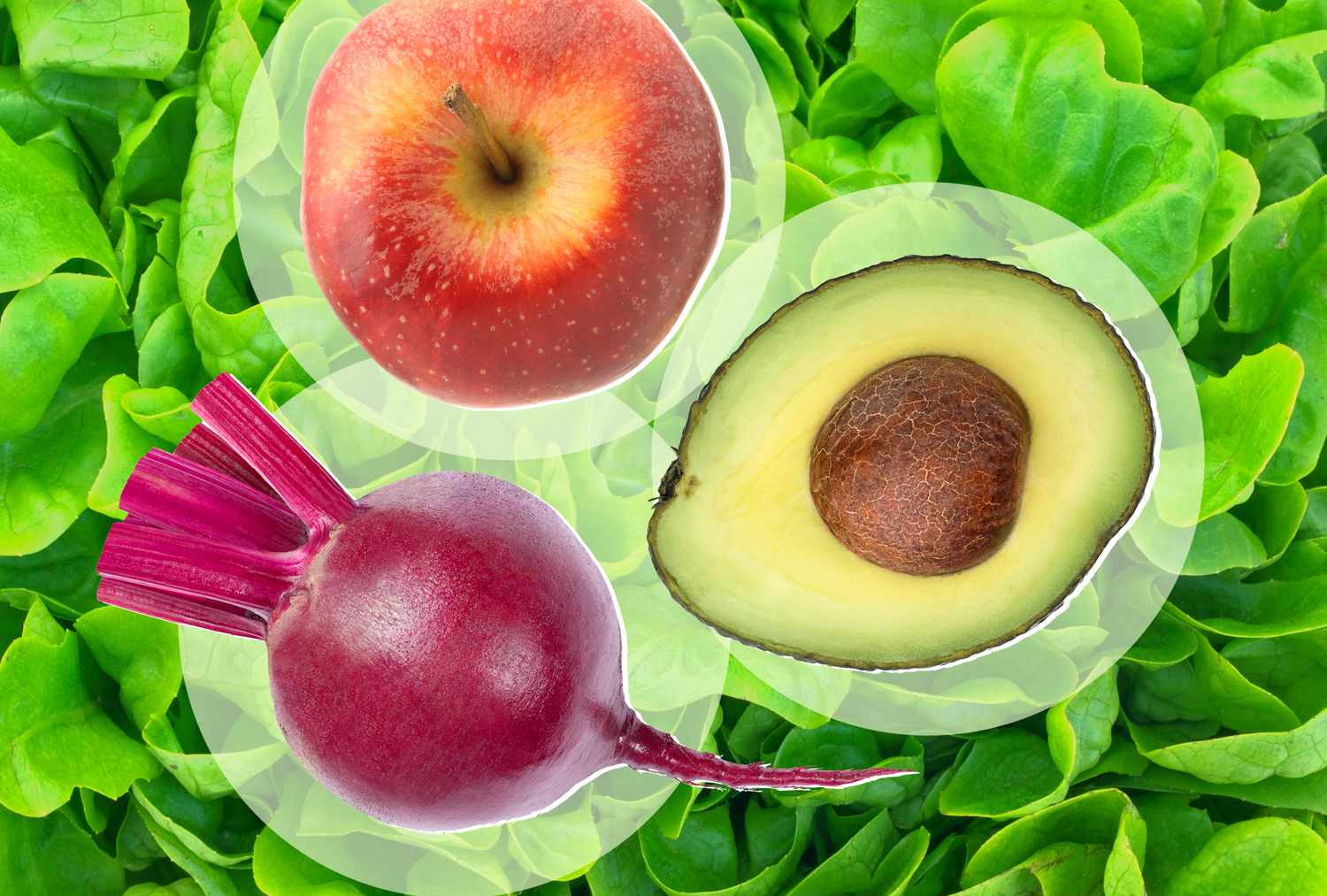Your gallbladder is a small organ tucked beneath your liver in the upper right side of your abdomen. Its main job? Storing bile–a digestive fluid your liver produces to help break down fats. When you eat, your gallbladder contracts and releases bile into your digestive tract to support digestion.
A diet packed with nutrient-dense whole foods may help support gallbladder health, but a diet high in added sugars and saturated fats could increase your chances of developing gallstones and other gallbladder issues. Foods that are packed with fiber, vitamins, minerals and antioxidants may reduce your risk of developing gallstones or other gallbladder complications. “High-fiber foods such as fruits, veggies, whole grains and legumes can support a healthy gallbladder by aiding in digestion and the prevention of gallstone formation,” says Carly Hart, RD, LD, a Montana-based registered dietitian. Certain eating patterns–like the Mediterranean and DASH diets–can also support gallbladder health.
We spoke with registered dietitians to find out which foods to eat to support a healthy gallbladder, plus tips and recipes for incorporating them into your routine.
1. Leafy Greens
Leafy greens like spinach, kale and Swiss chard are packed with magnesium and fiber, which may help regulate bile production and reduce the risk of gallstones.
“Fiber supports gallbladder health by aiding in digestion and moving food through the colon,” says Hart. “Fiber may also lower your LDL cholesterol and flush excess bile from the body, both of which are protective against the risk of gallstone formation,” she adds.
While salads are a great way to consume more leafy greens, there are plenty of other ways to enjoy them. Check out these 18 Leafy Green-Packed Recipes That Aren’t Salads. You can also blend greens into smoothies, like our Really Green Smoothie, which combines gallbladder-friendly foods kale and avocado.
Store unwashed greens in a sealed container with a dry paper towel to absorb excess moisture and prevent wilting. Keep in the crisper drawer of your fridge for up to 5 days. If they start to wilt, soak them in cold water for 10 to 15 minutes to revive their crispness.
2. Avocados
“You don’t need to eat a fat-free diet to support your gallbladder health, but lowering saturated fat intake can help reduce symptoms of gallbladder problems,” Hart explains. “Choose unsaturated fats over saturated fats when possible,” she adds.
Avocados are rich in healthy monounsaturated fats, which support bile production without overwhelming digestion. In addition to their healthy fat content, avocados are also rich in fiber, potassium and antioxidants that reduce inflammation in the body.
We love blending avocados into smoothies, like in this Avocado-Banana Smoothie, or spreading them on Toast with Jammy Eggs. We also recommend adding them to salads and grain bowls or using them as a creamy base for homemade dressings and dips.
Store unripe avocados at room temperature until they soften. Once ripe, refrigerate whole avocados to slow further ripening–they last about 5 to 7 days in the fridge. To save cut avocados, spritz them with lemon or lime juice, wrap them tightly and refrigerate them to prevent browning.
3. Lentils
Lentils are a high-fiber, plant-based protein that can help support healthy digestion, bile flow and overall gallbladder function. They are easy to digest, making them a great alternative to high-fat animal proteins, which may contribute to gallstone formation in some people
One cup of cooked lentils provides about 15 grams of fiber, “which helps regulate digestion, prevent constipation, and support healthy bile production—a key factor in reducing the risk of gallstones,” Hart says.
We love lentils in soups and stews, such as our Red Lentil Soup with Saffron or this Lentil Stew with Salsa Verde. They also make a delicious addition to salads and grain bowls.
Dry lentils can be stored in an airtight container for up to a year. Cooked lentils can be kept in an airtight container for 4 to 5 days or frozen for up to 3 months.
4. Apples
Apples contain pectin, a type of soluble fiber that helps bind excess cholesterol in the digestive tract. “Since cholesterol buildup in bile can contribute to gallstone formation, eating fiber-rich foods like apples may help reduce this risk,” says Hart. Apples are also rich in polyphenols and vitamin C, which help reduce oxidative stress and inflammation that can impact gallbladder and liver health.
Apples are extremely versatile and great for a convenient on-the-go snack. “I love pairing an apple with nut butter or yogurt for a balanced, fiber-rich snack,” Hart suggests. For crunch and sweetness, add thinly sliced apples to a green salad or cabbage slaw, like in our Mixed Greens with Lentils & Sliced Apple recipe.
Store whole apples in the crisper drawer of your fridge to keep them fresh for 4 to 6 weeks. Keep them away from bananas and other ethylene-producing fruits, as they can cause apples to ripen faster. If you’re slicing apples ahead of time, try spritzing them with lemon juice to prevent browning and store them in an airtight container in the fridge.
5. Beets
Beets are a nutrient-packed root vegetable that may support your gallbladder, liver and overall digestive health. Their fiber, betaine and antioxidants make them a powerful food for supporting bile production, reducing inflammation and promoting healthy digestion.
Roasting or boiling beets makes them tender and sweet. We love the sweet and tangy flavor of these Honey-Roasted Beets. Want something simpler? Try tossing cooked beets with olive oil, salt and pepper. Add them to salads or grain bowls. Beets can also be juiced or blended into smoothies, like in our Anti-Inflammatory Beet Smoothie.
Store fresh, unpeeled beets in the crisper drawer of your fridge for up to 2 weeks. Once cooked, beets should be stored in an airtight container in the fridge for up to 5 days. The greens of beets can be used just like leafy greens and should be stored separately from the root in the fridge, wrapped in a paper towel to absorb moisture.
Other Tips for Supporting Gallbladder Health
- Stay hydrated: Drinking enough water is essential for overall health, including supporting gallbladder function. Water makes up about 60% of our body weight and “is crucial to our body’s ability to function and thrive,” adds Molly Bremer, M.S., RD, an anti-diet dietitian at Mosaic Nutrition.
- Eat regular, balanced meals: Eating smaller, more frequent meals throughout the day can help prevent overloading the gallbladder, allowing bile to be released more regularly for digestion.
- Limit caffeine and alcohol: Too much caffeine and alcohol can irritate the digestive system and impair gallbladder function. If you consume caffeine or alcohol, doing so in moderation can help support a healthy gallbladder.
- Exercise regularly: Physical activity supports a healthy weight and good digestive health, both of which support gallbladder health.1 Aim for at least 30 minutes of movement most days of the week. Choose an activity you enjoy so you’re more likely to stick with it.
The Bottom Line
Eating whole, nutrient-dense foods that are a good source of fiber, healthy fats and antioxidants can help reduce the risk of gallstones and other gallbladder issues. Eat more leafy greens, avocados, lentils, apples and beets to promote healthy bile production and digestion. In addition to eating these foods, focus on other gallbladder-friendly lifestyle habits–like drinking water, limiting alcohol and caffeine intake, and getting regular movement.


